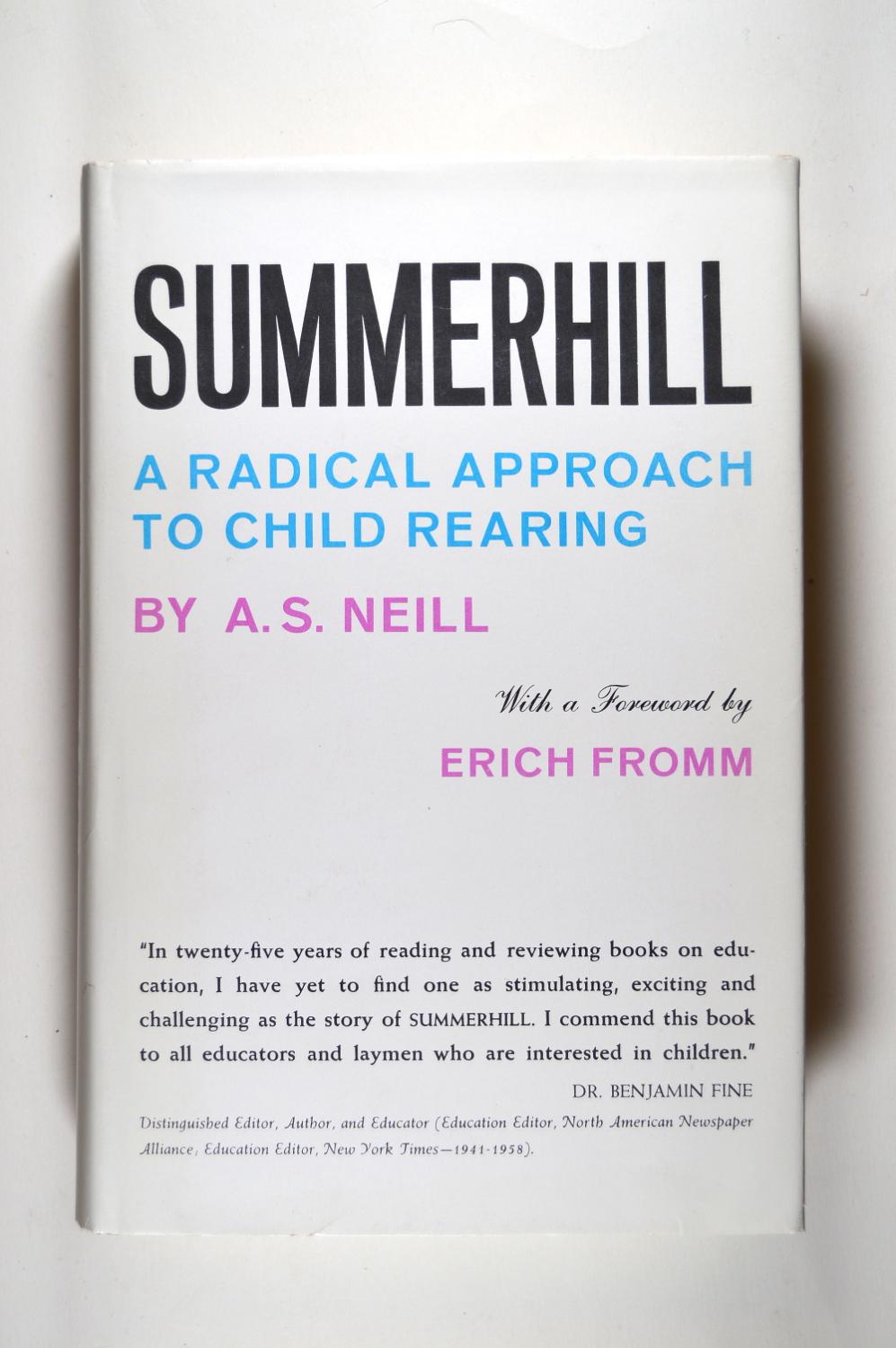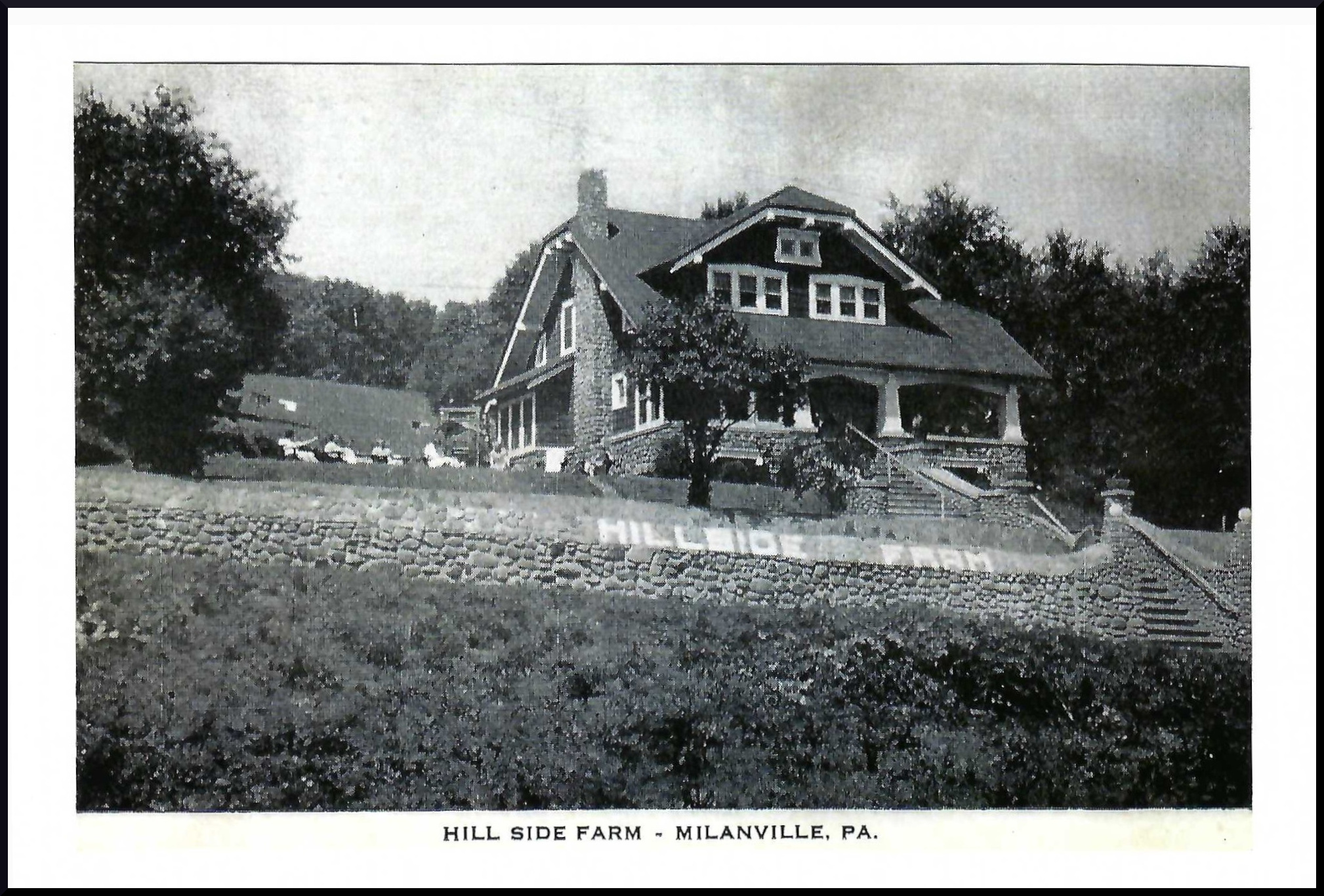Innisfree, 1970-1998
By Tom Rue
Chapter 3 - The Summerhill Association
In the fall of 1969, a conversation occurred among several teachers in a faculty dining room at Montclair High School. Montclair was then, and remains, an affluent community. English teachers Clarke Maylone and math teacher Bud Rue and Bill Brown bantered with each other about how they would run a school if they ran the world. A school secretary named Priscilla seated nearby challenged the men for their big talk about reforming the American system of education and their lack of action.
Throughout the following autumn and into winter, it was not just teachers but dozens of high school and junior high aged students who joined in the "talk" both at school and in the Rue living room at 6 Fairfield Street in Montclair, imagining what an ideal school program would look like and how to create such a setting. For whatever reasons, the small group of public-school teachers who founded Innisfree chose not to seek accreditation of Innisfree as a school (yet), largely for financial reasons, opting to apply for an Organized Camp license instead.
Administrative state requirements for either license are substantial, but more so to be chartered as a private school. This group of experienced teachers and students, who started talking in the fall of 1969 (after a number had returned from attending the Woodstock festival the previous summer, and there were students concerned about potentially being drafted), wanted more rapid movement. The discussions taking place at Montclair High School and in various teachers' living rooms evolved rapidly to a consensus of a tentative associational name, and then adopted a corporate name. They paid for liability insurance and employed lawyers, accountants, and real estate agents to work with them toward making their collective vision a reality. The Summerhill group meetings decided to acquire "a place" somewhere that would serve the needs of the group.
I do not know how many other sites other than Hillside Acres in Milanville were visited by the group from Montclair during early 1970, but my recollection is that it was an active time in the Rue household. I recall accompanying my parents (Bud and Ann Rue) in their VW bus to check out more than one property in the Catskills and/or Poconos. The one distinctive visual element that I recall is of snow along the sides of the highway during a season when we had none where we lived. I also have a mental image in my mind, which I believe to be organic memory, of my parents and the Browns and Maylones talking with Oscar Ropke in the parking lot of Hillside Acres. I do not remember anything else about that first visit to the property.
It might be that the group was partly attracted to this region rather than elsewhere by the nearby location of the Woodstock festival the previous year. If that was not a conscious factor, it could not have hurt in the selection. The group continued to raise funds in order to incorporate and obtain tax-exempt status with the IRS, publish literature, and buy advertising in local newspapers, The New York Times, and Village Voice, purchase the Milanville property, and satisfy all the necessary details to become licensed by the Commonwealth of Pennsylvania, if not as a school then as a summer camp or other public accommodation where programs could be held. And that was just the preparation. After that, would come the administration of a summer camp program the paradoxical purpose of which was deconstructing the administration and processing the experience together of creating a community with no rules.
Though a number camper slots were reserved each summer for scholarships based on financial need, during the summers of 1970 and 1971, the majority of youthful participants and professional staff (several public-school teachers on summer break) were white, well educated, socially privileged men and women, plus a few people of color. The corporation advertised, and its founders genuinely believed in, a policy of racial non-discrimination. However, the group clearly originated in Montclair, not Newark.
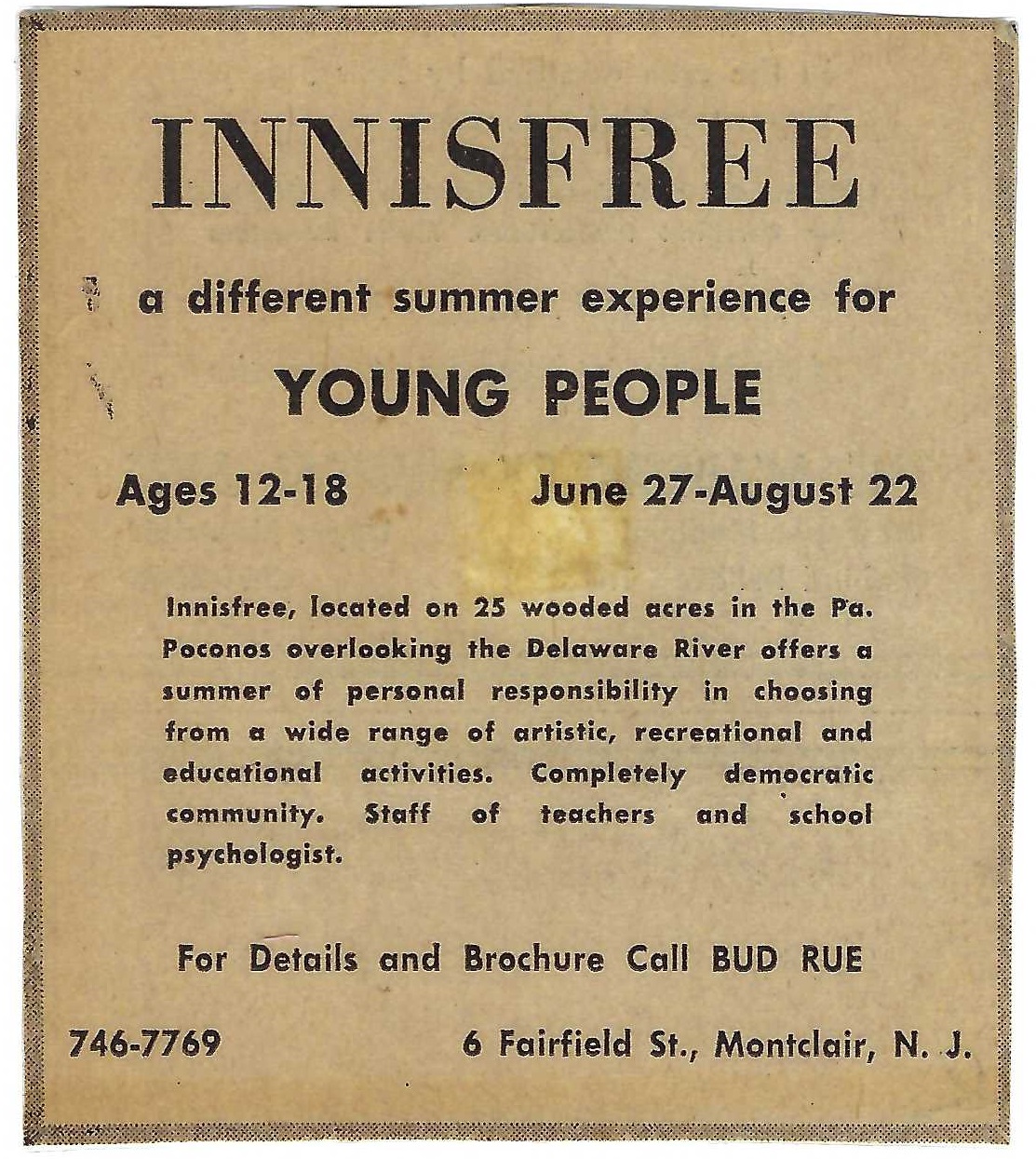
Some had stronger verbal and social skills than others when they arrived, and this influenced their ability to assert themselves in decision making processes. Others developed in these areas by participating. Bud Rue did most of the bulk food shopping for Innisfree programs. I recall going with him on some shopping trips to a discount outlet in Indian Orchard, as well as to the Victory Markets in Callicoon or Monticello.
A cook by the name of Carl was hired (the only paid employee), but he soon resigned because of he expected a more structured schedule. Cooking was coordinated mostly by the older women in the community, with specific chores accepted by campers during general meetings. Everyone accepted assignment of some kind of chore or activity around the place. No written lists of these chores have survived, but I recall being faulted by my parents for not doing an adequate job feeding the chickens. I do not recall suffering any consequences for that negligence. Through such voluntary work assignments, most of what needed to be done was accomplished equitably.
If asked, many or most at Innisfree those first two summers might have described their political orientation as liberal, left of center, radical, or revolutionary. There may have been a few who were relatively conservative in the modern meaning, or maybe that was more a character trait in some than any of their politics. Political conservatism might have led to ungrounded suspicions of being an FBI informant among some Innisfree participants. Conversations that I remember at early Innisfree about politics with people of varying ages were often strong on feminism, opposed to the Viet Nam war, libertarian (writ small), and favorably inclined to period music. However, as no known notes were kept of such early conversations at Innisfree, the only available source is memory.
Some at Innisfree who were of voting age in 1968 actively supported the campaign of Eugene McCarthy for President. Some identified as JFK style Democrats. At the time, though, while Innisfree's concern was not political in a partisan sense, its formation and activities were absolutely political. It came to fruition in a middle to upper class community (Montclair NJ) one year after the Aquarian Festival of 1969 in the Town of Bethel. It came at a time in our country when many were hoping, and some were actively working in a variety for a more just, equitable and less oppressive society, in the contexts of parenting, education, and in a macro sense. Ideas of social and economic justice seemed to be spreading, though sometimes diffuse and unfocused. There was reaction to the Viet Nam war, the feminist movement, evolving attitudes toward sexual behavior and gender identity and movement away from patriarchy, the expressiveness of rock music, widespread cannabis use, and other substances. Innisfree was a social experiment, a sort of personal growth laboratory (though the camp's founders did not call it that), planned with the hope of promoting a shared commitment to better communication and human connection, learning, and a sustainable world. It was hoped this would lead to broader social progress and freedom from oppression. Some delusions of grandeur may have been present in the hopes for changing the world, but there was no shortage among the organizers or the participants of well-intentioned energy, genuineness, and good will. The ultimate goal was Utopia, and Innisfree was where they wanted that to start.
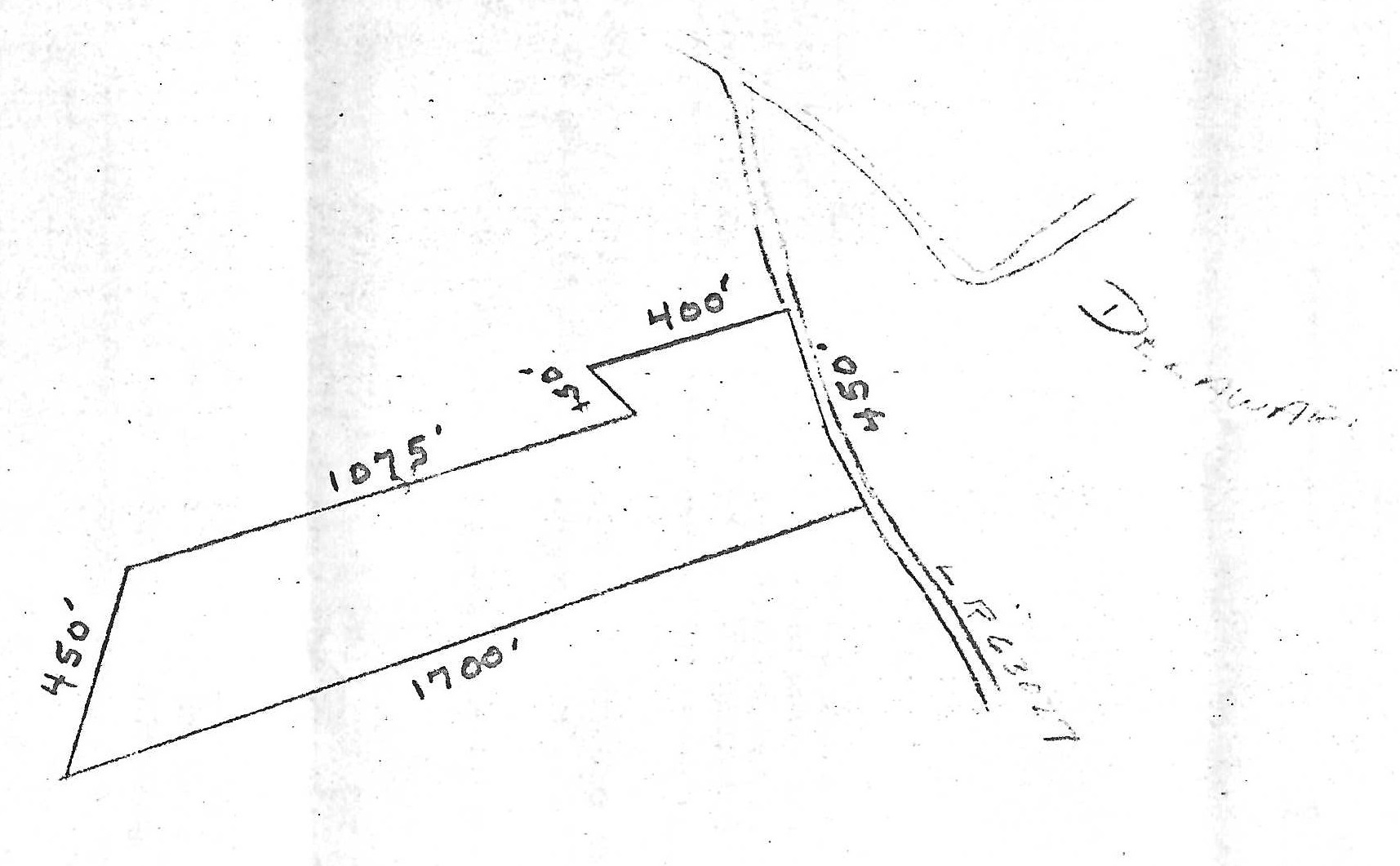
On April 18, 1970, a 13.7-acre tract overlooking the Delaware River now known as Innisfree was purchased from Oscar and Vivian Thomas Ropke by Innisfree Corporation. However, generally speaking, a corporation does not exist until it is incorporated. When it was filed three weeks later in Trenton, on May 12, 1970, the certificate of incorporation named the following named trustees: Clyde B. Rue, Ann Rue, William Brown, Gail Brown, Sanfurd G. Bluestein MD, Peter Malcolm, and P. Clarke Maylone (three Montclair High School teachers, their wives, and two early donors). The mortgage to Oscar and Vivian Ropke was signed by Bud Rue knowing that if the corporation ever defaulted (which never happened), he would have been liable for the balance of the mortgage. The Ropkes had accepted the offer, and the group consensus was to proceed. There was a lot to complete in order to open the camp program in early June as had by this point been promised to participants, parents, and other donors, none of which could move forward without a "bond" on the property, Bud explained it. So, he signed it, believing that he was putting his family's home in Montclair up as collateral. In the end, the mortgage to the Ropkes went well. Payments were made on time until the note was satisfied in full.
The condition of the property was maintained up to the mortgagees' expectations, though the intensity of pounding those buildings sometimes received from Innisfree guests was likely much greater than the former Hillside Acres resort. Many improvements were made to the property over the years to keep it from "going back to the earth", elevating its both its economic value and offering free or low-cost meeting space and accommodations to numerous local nonprofit and social local groups.
A subsequent real-estate appraisal by Wayne-Pike Appraisal Services Co. in Hawley, writing years later on August 11, 1987, described the spot as "a quiet and peaceful location and is presently being used as its highest and best use." In short, the space was perfect for its intended purpose.
The inspiration for those who met on Fairfield Street and elsewhere in Montclair, NJ under the pre-incorporation name of "The Summerhill Association" to name to formally adopt "Innisfree" as their corporate name came during February or so, during one of the many group meetings held in Montclair, when high school English teacher Clarke Maylone shared his acoustic musical rendition of Yates' well-known poem, the Lake Isle of Innisfree.
Between that date and June 10th, the organizational details (or lack thereof) of Innisfree's loosely defined "Organized Camp" program was described as an educational experiment based on a Libertarian educator from Britain, A.S. Neill, as outlined in his widely circulated 1959 classic, "Summerhill". The professionals (teachers, psychologists, artists, writers, etc.) who initiated the Innisfree project in 1970 were exploring the fundamental nature of education, its aims, methods, implications, and the roles of educators and learners. During the fast-paced first few months of 1970, Innisfree's organizers filed incorporation papers, obtained tax-exempt status, liability insurance, applied for and received licenses from the Pennsylvania Department of Environmental Resources (DER) as an Organized Camp and as a Public Eating and Drinking Place, and recruited a full complement of campers. The idea gained prominence in Montclair as this group of teachers and students explained the plans to parents through personal meetings, letters to the editor, fund-raising events, and larger gatherings at places like the Unitarian Universalist Church of Montclair, Watchung Congregational Church, Montclair State College, and elsewhere.
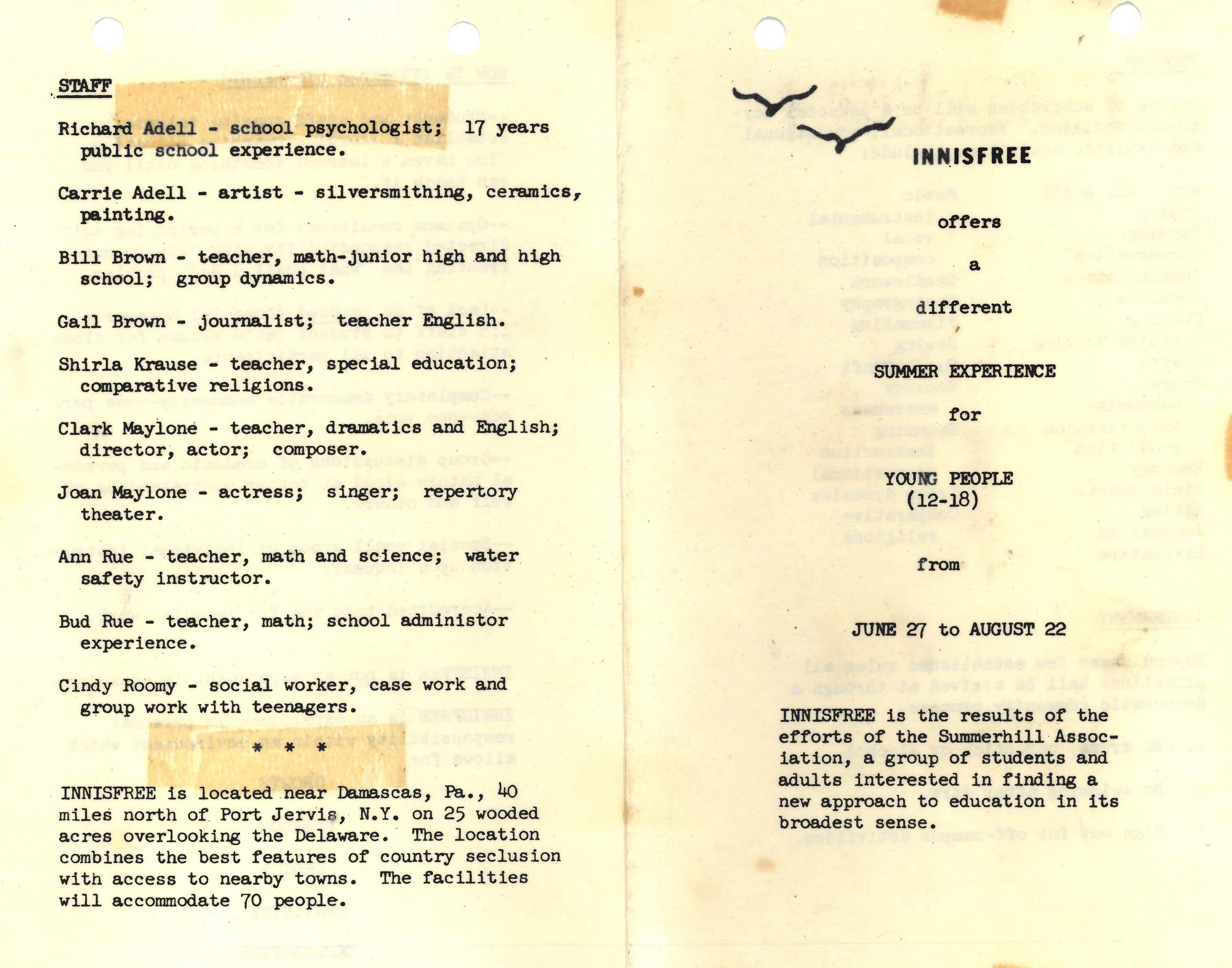
Incorporation and IRS Tax-Exempt Status
On May 10, 1970, a Certificate of Incorporation (#S130323) was filed by attorney Sydney H. McKenzie III of the Montclair firm of Conrad & Jones with the Secretary of State of the State of New Jersey establishing Innisfree Corporation as a legal entity.
The corporation's Application for Recognition of Exemption (IRS Form 1023) was completed and filed with the Internal Revenue Service on December 22, 1970 by the same attorney. The application explained:
"Innisfree was formed primarily to provide non-profit educational, artistic and recreational facilities for young people (ages 12-18) without regard to race or economic status where they could interact in a self-governing atmosphere with the participants deciding upon the rules and regulations, imposing the necessary restrictions, and delegating the responsibilities necessary for the functioning of the community. In order to have a complete cross-section of the outside community involved, extensive scholarship assistance is anticipated."
After almost a year of correspondence and waiting, during which tax-exempt status remained pending, on December 3, 1971 a Letter of Determination was issued by the Chief of the Rulings Section of the Exempt Organizations Branch at the IRS in Washington confirming that Innisfree Corporation had complied with all legal requirements to be granted tax-exempt status under Section 501(c)(3) of the Internal Revenue Code of 1954. The letter noted:
"The information furnished shows that you were incorporated on May 12, 1970, under the New Jersey non-profit corporation laws for the purpose of owning, operating, conducting, and maintaining a camp for recreational, educational, and general health purposes," the letter stated. "If you wish you may release this letter to your local news media as confirmation of your desire to make your nondiscriminatory policy known to all who may be interested."
Despite being ruled by the IRS as an entity that was exempt from taxation, which was confirmed separate state rulings in three states with respect to sales and use tax, from 1970 until 1998 local property taxes were voluntarily paid to Damascus Township and County of Wayne. The IRS ruling was important to the new organization (as to any small nonprofit) because it allowed donors to the fledgling corporation to deduct financial contributions from their personal income tax.
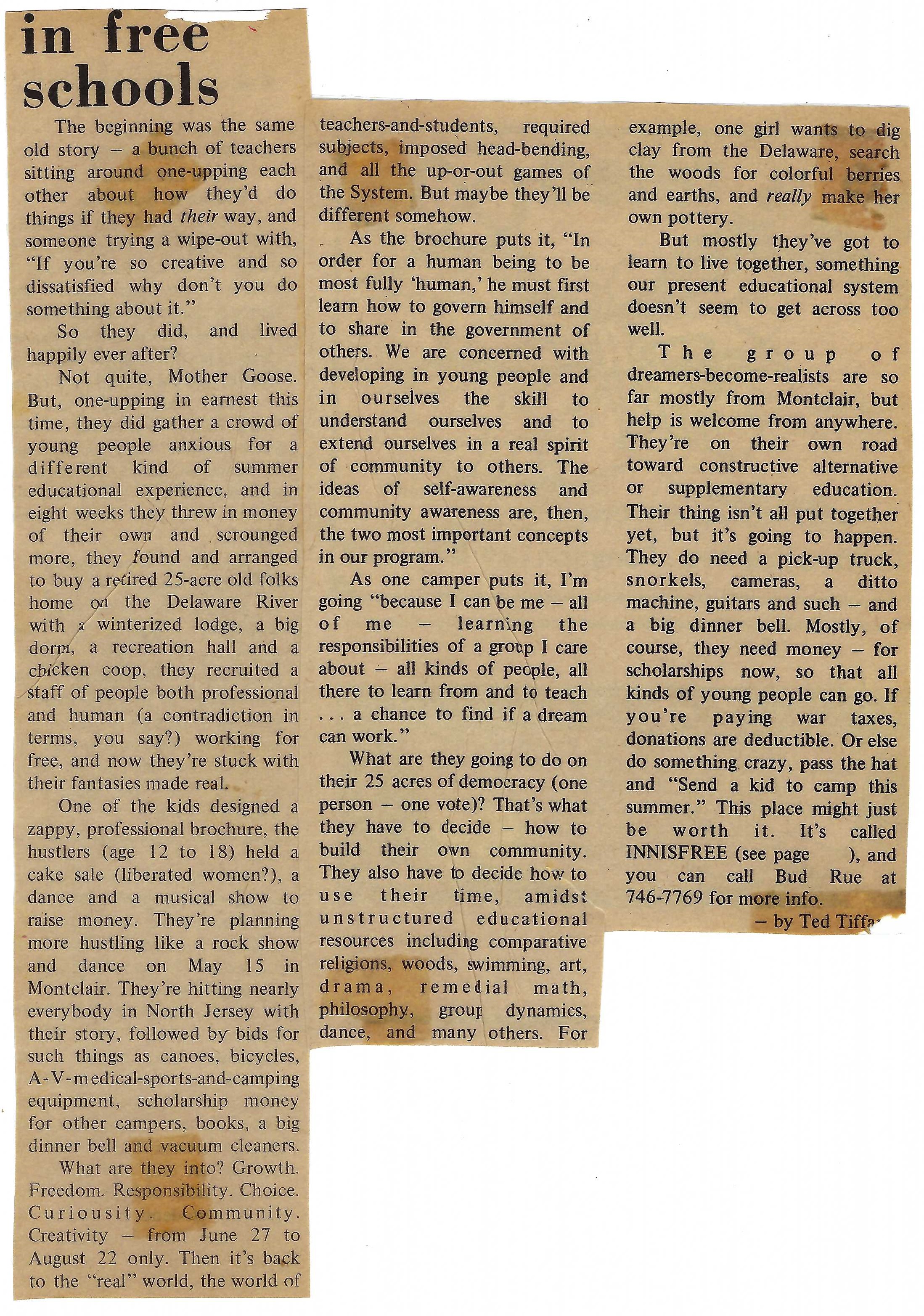
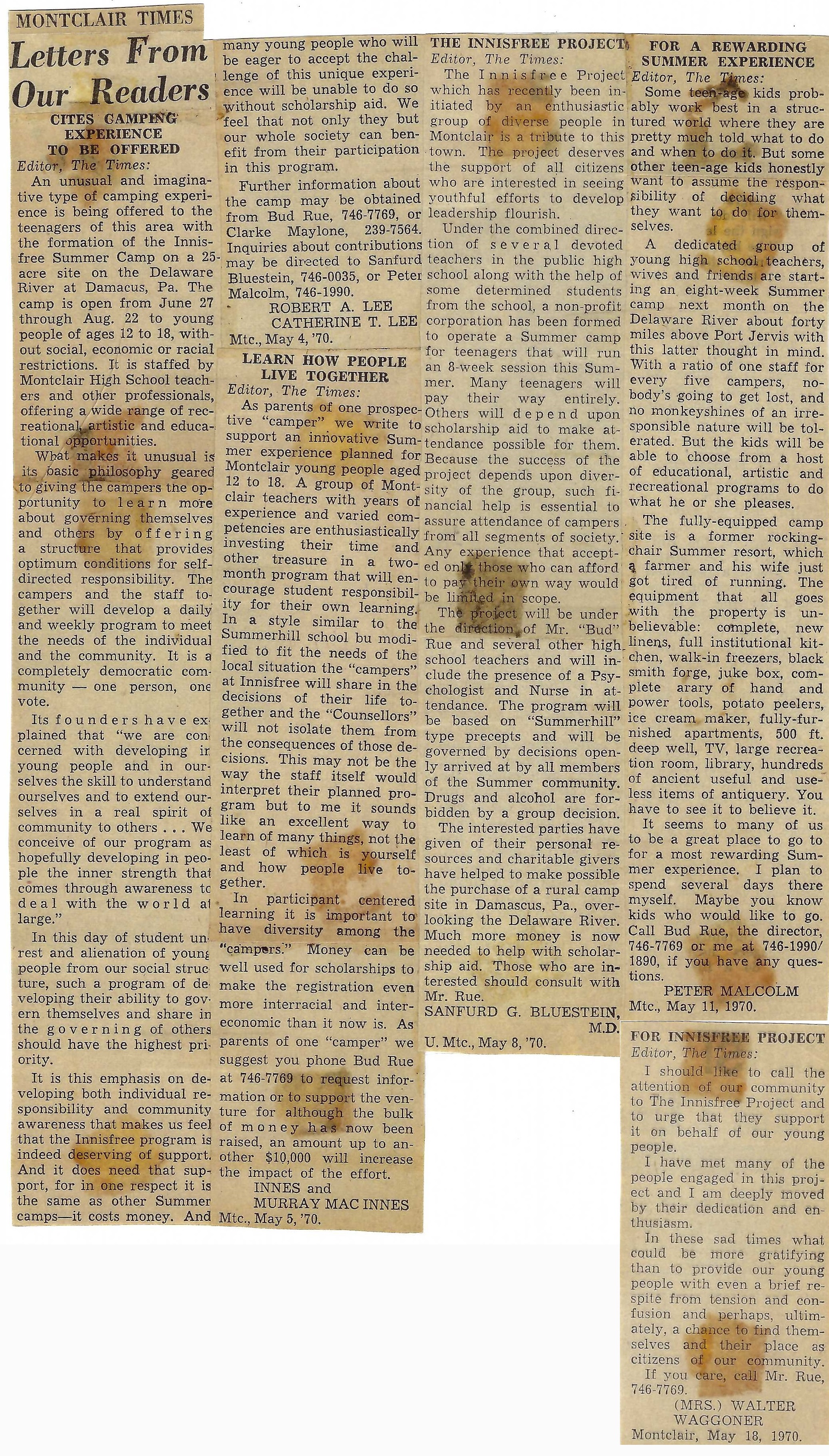
Back: Chapter 2 - Hillside Acres | Next: Chapter 4 - Welcome to the camp


